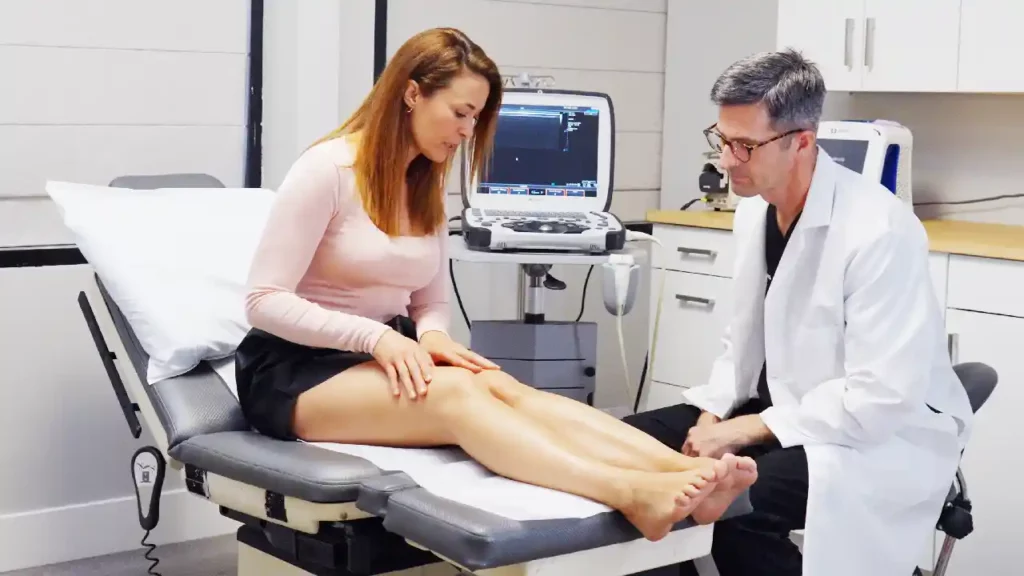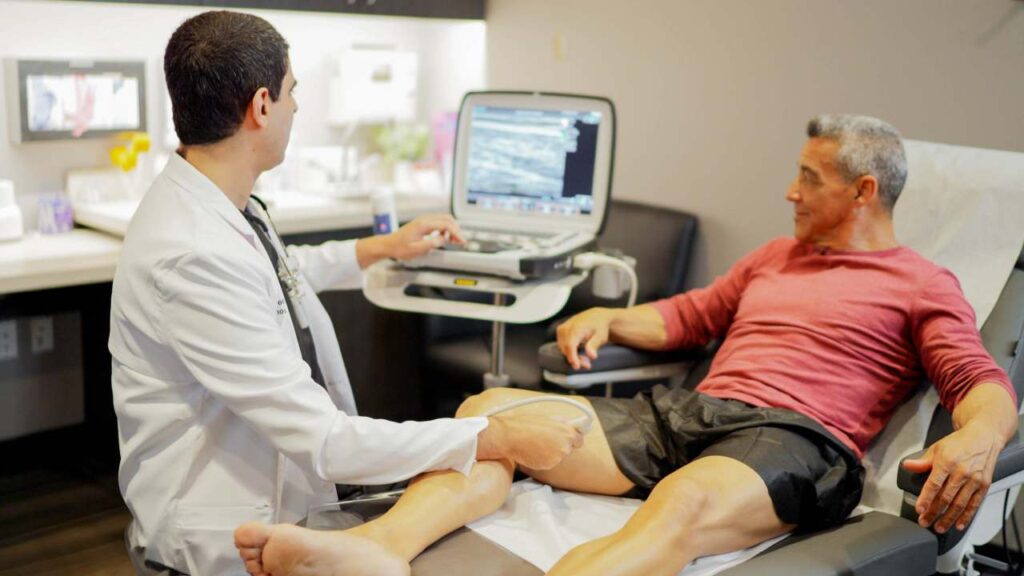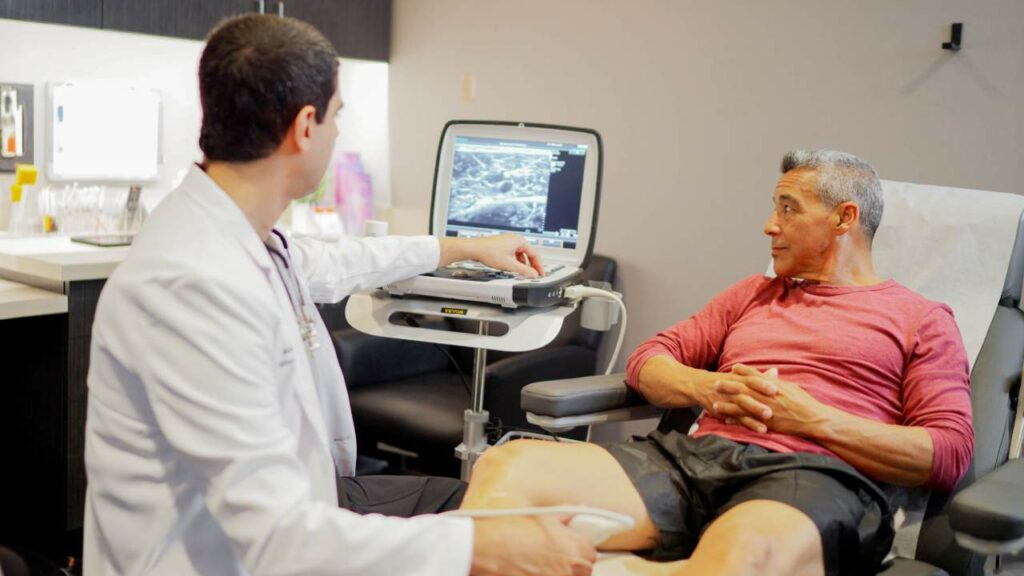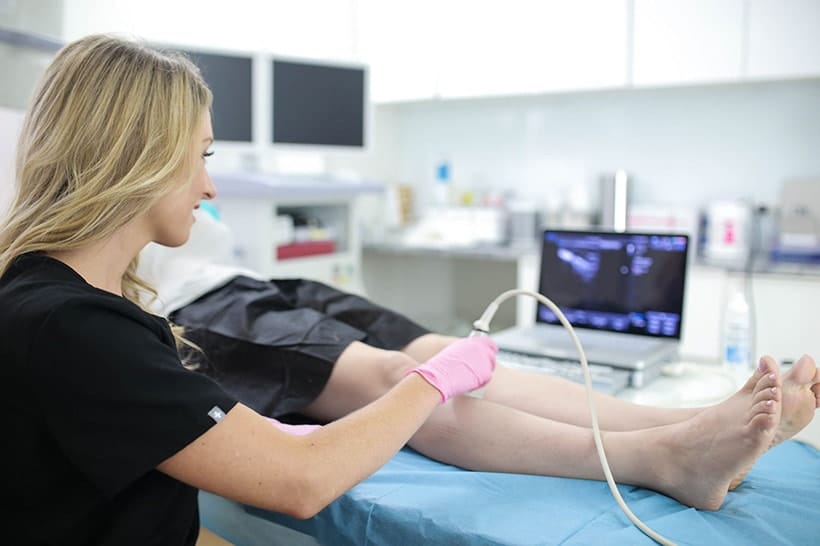What Are Varicose Veins?
Varicose veins are blood vessels that have become pressurized. They often develop when a valve inside a deeper vein fails to close tightly. Blood begins flowing in reverse and accumulating in the vein, which causes the vein to swell and contort. These bulging, engorged blood vessels are the varicosities you see beneath your skin. Veins are tasked with pumping blood back to the heart. To do so, valves must close once blood passes through them, to keep blood flowing toward the heart. With a varicose vein, blood is pooling in the vessel and no longer pumping blood as efficiently. It’s often advised to close those veins, so blood can flow into nearby veins that are capable of pumping it back to the heart. Book an appointment with our Harvard-trained vein doctors in California to learn about treatment options.
In addition to inefficient blood flow, varicose veins can cause a range of symptoms, including pain, swelling, itching, cramping, heaviness, and restlessness in the legs. Over time, the symptoms can progress to debilitating levels, which you’ll read more about below. While some varicose veins don’t become problematic or symptomatic, a patient can’t predict that by looking at their skin. See a vein doctor at the first sign of trouble to prevent complications.

What Are the Risk Factors for Developing Varicose Veins?
Varicose veins are common, especially as we age. They’re more prevalent in women since hormones play a role. But the top predictor of varicose veins is a family history of them. If both of your parents have them, there’s a higher than 90 percent chance you will get them. The mechanism that causes them is almost always excess pressure on or in the vein. For instance, pregnancy increases blood volume in the veins in order to supply the fetus. That elevates internal pressure. The expanding uterus can put pressure on the pelvic veins beneath it, which is a source of external pressure. And hormone shifts that occur with pregnancy also elevate blood pressure. Here are some of the most common risk factors for varicose veins.
- Family history of spider veins or varicose veins
- Chronic Venous Insufficiency
- Pregnancy
- Obesity
- Hormone replacement therapy or birth control
- Long periods of sitting or standing
- Sedentary lifestyles
- Aging
- Being female
What Is the Best Treatment for Varicose Veins in California?
The best treatment for varicose veins in California depends on the patient. We all have unique vasculature and venous pathways, including connecting veins that must be considered before treatment. The best vein doctors are trained in ultrasound imaging tests, like vein mapping, that look at your overall venous health. The top vein specialists also use ultrasound guidance to administer treatment and observe how it works in your veins.
Some patients don’t need ultrasound-guided procedures. Small, superficial spider veins are often treated with a quick injection of sclerotherapy that doesn’t necessitate it. But it’s best to choose a doctor who’s trained in ultrasonography in case you do. Most surface vein damage stems from valve failure in a deeper vein. Treating that is essential to lasting results and the prevention of more spider or varicose veins. Here are some of the top treatments that our vein specialists recommend.
- Sclerotherapy
- Radiofrequency Ablation
- Mechanochemical Ablation
- Vein Adhesives
- Endovenous Laser Ablation
How Well Does a Minimally Invasive Procedure Work?
Minimally invasive procedures have largely replaced vein stripping surgery for several reasons. They’re gentler, safer, faster, more affordable, and more permanent for most patients. Surgically cutting a vein out of the body can result in the vein growing back. Revascularized veins don’t contain valves, which means they’re more prone to the backward blood flow that often causes varicose veins.
A minimally invasive procedure seals the vein shut rather than cutting it out. This is a permanent solution when it’s performed correctly. Blood is rerouted into healthy veins nearby, and the sealed vein shrinks from sight and is no longer part of the circulatory process. Some patients need more than one type of minimally invasive treatment, or more than one session, depending on the extent of their vein damage. But, many patients only need a single appointment for permanent relief.
How Well Does Ambulatory Phlebectomy Work?
Ambulatory phlebectomy is a newer, less invasive vein stripping surgery. Traditional phlebectomy requires general or spinal anesthesia and several incisions through which vein doctors hook and remove a vein. Ambulatory phlebectomy uses a local anesthetic so the patient can remain awake. The doctors make punctures, rather than incisions, to pull the vein through. It’s a gentler surgery, but not as gentle as other methods like radiofrequency ablation or sclerotherapy. There is still risk of bleeding, infection, revascularization, pain, nerve damage, or other complications of surgery.
However, patients can go home quicker since they aren’t put to sleep, and there are none of the risks that come with general anesthesia. If you want the most effective treatment, inquire about non-surgical methods first. If you aren’t a candidate for those (reasons include blood clots or highly complicated or tortuous veins), then ambulatory phlebectomy might be a better option for you than traditional vein stripping surgery.
What Happens If You Don’t Treat Varicose Blood Vessels?
If you don’t treat varicose veins, there are many potential outcomes. Some patients’ blood vessels won’t worsen or produce symptoms. Others will develop the pain, cramping, swelling, itching, heaviness, or restlessness we mentioned above. In more severe cases, patients can develop slow-healing venous ulcerations, profuse bleeding when the vein is scratched, venous stasis dermatitis, permanent hyperpigmentation, and more. Some patients avoid a consultation and try to wear compression stockings or treat vein symptoms at home. But, the sooner you see a vein doctor, the better your outcome will be. The symptoms are reversible, and the complications are preventable, if you see a vein specialist in time.
Which California Vein Doctor Is Best?
The best California vein doctor is one who is board certified in a vascular field and who works at an accredited vein center. The top vein specialists are trained in ultrasound-guided procedures and favor minimally invasive procedures over surgery. It’s also important to choose one who accepts insurance and who verifies your coverage ahead of time. If they don’t take insurance, they might only offer cosmetic treatments at the surface of the skin. These aren’t effective against large varicose veins. Dr. Carly Guthrie, Dr. Jasmine Koo, Dr. Walter Lech, and Dr. Billy Schoenfeld meet these qualifications. Book an appointment with any of them for exceptional treatment for varicose veins.






